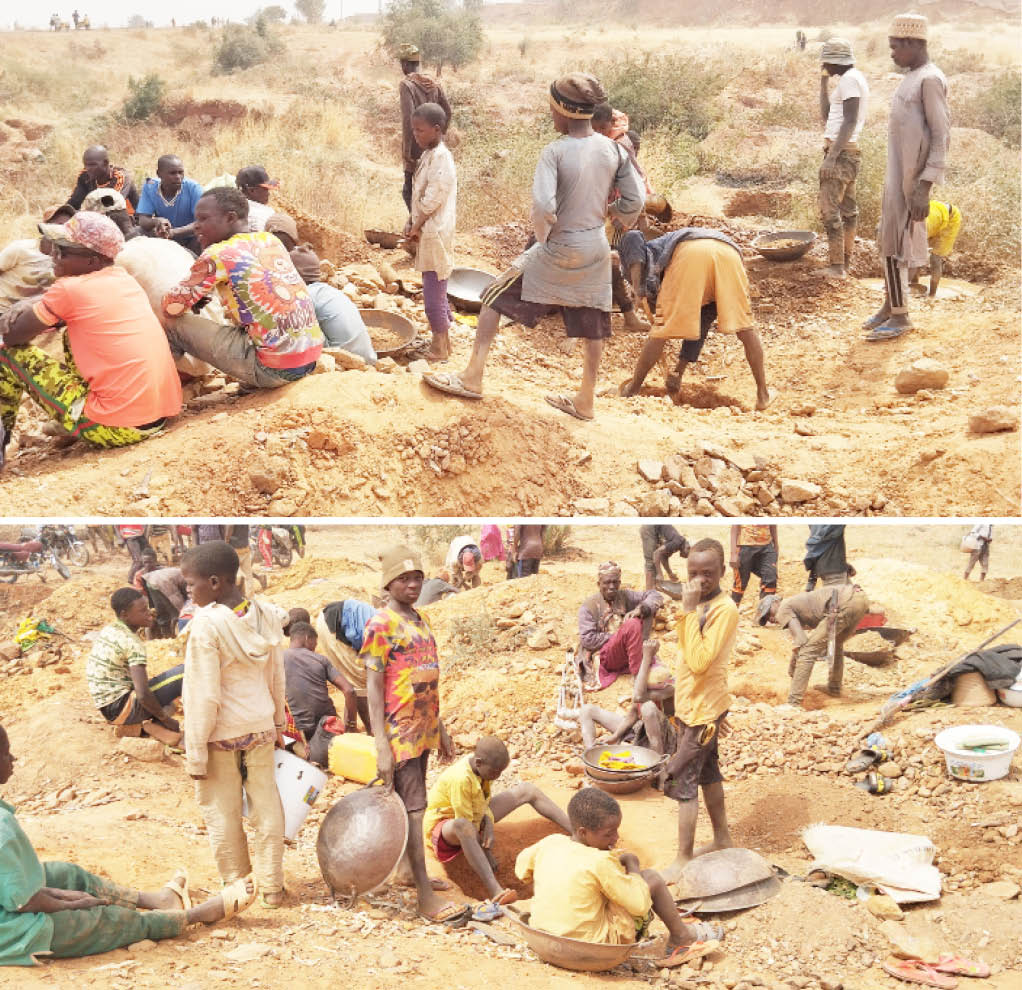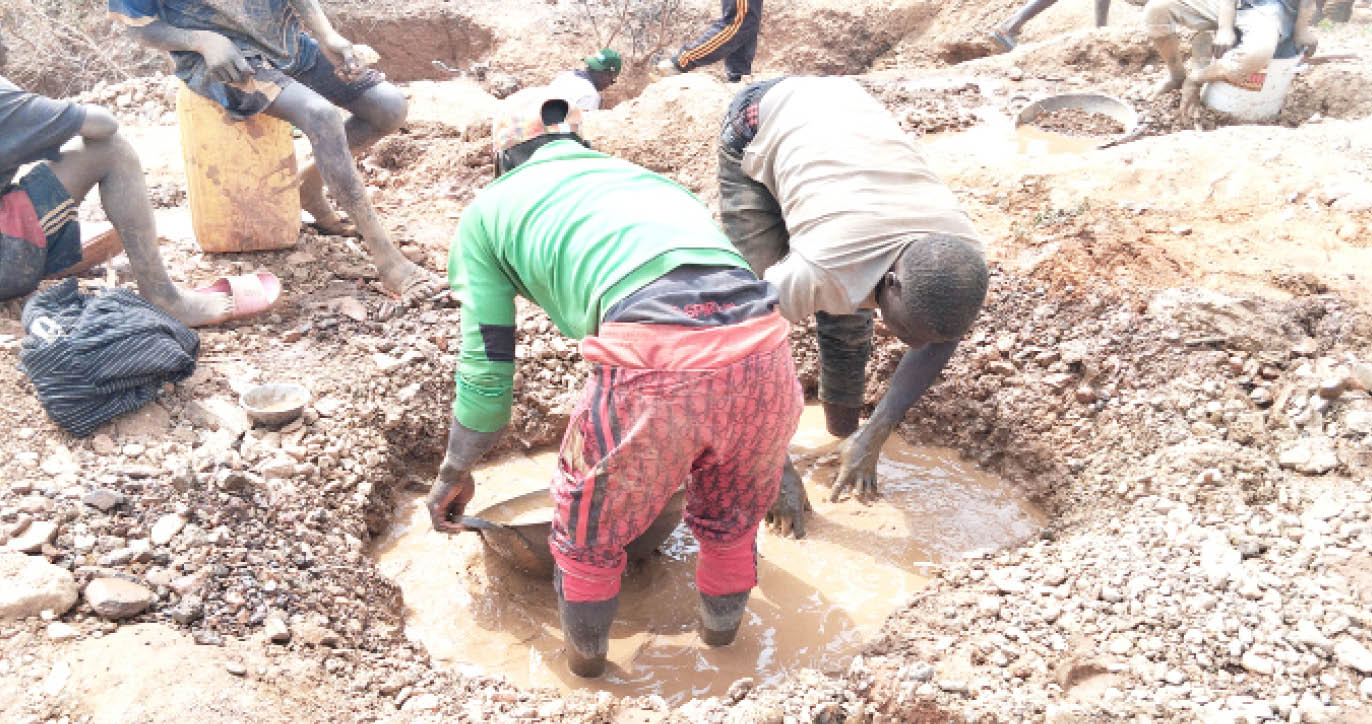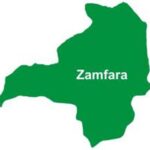People in many communities in Zamfara State are expressing fear following the recent decision of the Medecins Sans Frontieres (MSF), otherwise known as Doctors Without Borders, to scale down its operation due to the activities of bandits, Daily Trust on Sunday reports.
The MSF recently temporarily evacuated its international staff from some hospitals in Zamfara State, a development that has continued to raise concern among the communities that experienced pandemic lead poisoning in the past.
The MSF has drawn down its health care service delivery in Anka Local Government Area of Zamfara State and relocated its staff to Talata Mafara Local Government due to increased insecurity in Anka and environs.
Also, in December last year, the MSF temporarily evacuated a number of its staff from Zurmi Local Government Area due to persistent attacks by armed bandits.
How Nigeria’s economy nosedived in 10 years
Agribusiness: 48 youths get N50,000 each for investment
Zamfara State had in the last quarter of 2023 been hit by an unprecedented wave of banditry, kidnapping, cattle rustling and other related crimes, a situation that compelled the MSF to reduce its activities in the affected areas.
Although the suspension of the services was temporary, however, residents of Bagega, Abare, Dareta, Yar Galma and Nasarawa in Anka and Bukkuyyum local governments in Anka and Bukuyyum local government areas that experienced the pandemic of lead poisoning in the past have expressed fear over a possible upsurge of the killer disease.
According to the residents, the partial withdrawal of health care services by the MSF might have compounded the situation since activities of gold mining are being carried out in villages in the two local governments.

They called on both federal and state governments to take urgent and proactive measures in order to avert another lead poisoning outbreak in the state.
Malam Abubakar Isa, a resident of Bagega, recalled that, “During the 2010 lead poisoning pandemic, several women in Bagega village gave birth to babies with deformities, such as blindness, paralysis, acute malnutrition and learning disabilities, while adults experienced poor vision and severe fever.
“Children also experienced compulsion, partial paralysis in their legs and hands, blindness and acute fever, while others battled with partial deformities in their legs, private parts or belly.”
He recalled that it was the combined intervention of the MSF, in collaboration with both federal and Zamfara State governments that saved the situation.
He, however, expressed the fear that with the recent evacuation of MSF staff and reduction of its workforce in some facilities where it renders health care services, there is the possibility of an upsurge of lead poisoning pandemic in those communities.
“Our fear is that the pandemic might have returned to our communities due to shortage of manpower in our health facilities. We, therefore, want the government to take urgent steps that will prevent the upsurge of the deadly disease.
Another resident, Muhammad Auwal, confirmed that already, some of the symptoms of lead poisoning have started manifesting in the community due to the increasing activities of illegal mining in the area.
“We are blessed with huge mineral resources, especially gold, and our people are into illegal mining and they are doing it without taking any preventive measures against its hazards.
“So, the popular disease we locally called Gubar Dalma is gradually manifesting in this community and the doctors that are attending to sick people have reduced their services. So, if care is not taken, I am afraid the situation will be alarming in the near future.
“Although we are not medical experts, based on our past experiences, we know that the symptoms that are manifesting in some individuals are similar to that of lead poisoning.”
Malama Hajara Musa, who brought her daughter, Halima to MSF’s clinic in Bagega, said the baby was battling with malnutrition, adding, “I was not able to breastfeed because I don’t have enough milk in my breast. My husband, therefore, directed me to come to this clinic for treatment.
“I am happy the doctor said it was not a big problem as she would gradually recover. I was told to be coming to the hospital every two weeks to collect milk for my daughter and biscuits for myself. They said the biscuit would gradually enhance the milk in my breast to enable me breastfeed my daughter.
“Although my daughter has started getting better, I am worried about some of the doctors that have stopped coming to the clinic to attend to patients. Even though there are few Nigerian doctors working at the clinic, the shortage of manpower might have caused a serious setback to the community as far as health care service delivery is concerned.”
At the MSF health facility in Anka town, our correspondent found only indigenous doctors working, with the MSF attending to the few patients that were on admission at the facility, while the majority of patients have been evacuated by their relatives for fear of being attacked by armed bandits who persistently invade the community.
Banditry hitting hard
Findings by Daily Trust on Sunday revealed that the temporary evacuation of MSF staff from Anka and Zurmi might not be unconnected with increasing banditry in the two local governments.
A doctor at the MSF facility in Anka, who did not want his name in print because he was not authorised to speak to the press, said when attacks by armed bandits persisted in the community in December last year, the MSF management ordered for the evacuation of its international staff for fear of being attacked by the terrorists.
“Both our personnel and patients were terrified by the persistent bandits’ attacks in this community. We were afraid that the bandits could gain access into the hospital and attack both the patients and staff, and that was why the MSF management evacuated its personnel and discharged most of the patients that were on admission then,” he said.
Also, the MSF’s communication field manager, Georg Gassauer, in a statement, indicated that the MSF opted for the partial and temporary suspension of its services in Zurmi town following persistent attacks by the bandits in December last year.
Part of the statement reads, “Confrontations occurred dangerously close to the hospital supported by the MSF. The December spike in extreme violence, including killing and kidnapping, comes within a wider context of insecurity in Zamfara State.
“Our teams are committed to provide support to the Nigerian population in Zamfara State. We will do our best to maintain the operation, but we wish to see improvement in the security situation to be able to provide the appropriate medical care.”
The statement further indicated that the MSF teams, in collaboration with the Ministry of Health had in 2023, carried out 448 surgical interventions, provided 700 emergency consultations and assisted 5, 674 deliveries in Zurmi General Gospital. It also implemented activities in Shinkafi, Talata Mafara and Gummi general hospitals with pediatric units and malnutrition centres.
History of lead poisoning in Zamfara
The dark memory of lead poisoning that started in 2008, which caused the death of many children in Bagega, Abare, Nasarawa, Dareta and Yar Galma communities of Anka and Bukkuyyum local government areas and memories of those terrible days are still fresh in the memories of the affected residents.
This was when residents resorted to illegal mining in their personal farms, not minding or being ignorant of the danger associated with the mining activities.
In Bagega, a village located about 30 km south of Anka town, there were about 20 local mining processing plants and 12 plants in Abare village in Anka Local Government. Also, over 10 sites are being operated across Yar Galma, Nasarawa and Bukkuyyum villages in Bukkuyyum Local Government Area of the state.
Daily Trust on Sunday recalls that before the devastating incident, gold mining, which involves crushing and drying of the element, was done outside living rooms or inside family compounds in the villages where locals conduct mining activities. This development gave rise to contamination of the soil, thus exposing the residents, especially children, to the risk of lead poisoning.
Although the lead poisoning case was first discovered in Bagega community, it became more pronounced between March and June 2010 after it claimed the lives of 163 people in the state, including 111 children, according to various reports. Also, about 300 children died of lead poisoning at Yar Galma community of Bukkuyyum Local Government.
It was said that the annual immunisation exercise led to the discovery of a high number of child deaths in the affected areas. And investigations revealed that the people had been digging for gold at the times of their deaths in a lead-loaded area.
The development prompted the medical team of the Médecins Sans Frontières to further investigate the matter, and the team found unusually high levels of lead in the blood tests.
According to the 2010 report by the MSF titled, ‘Lead Poisoning in Zamfara State, an acute high level of lead poisoning is fatal in young children.” The report added that, “It can also kill older children and adults, and may result in brain damage, infertility, kidney failure, miscarriages/stillbirths and other major health problems.”
Experts were then invited by the government to assist in the removal of toxic lead in the affected communities. In an effort to halt such cases, there has been a clampdown on illegal mining and carrying out a cleanup of the area.
While some residents were evacuated, enlightenment campaigns on the dangers of lead mining were given to locals, with a view to curtailing the situation.
Daily Trust on Sunday reports that after the resultant fatal deaths from the contamination, illegal mining activities were temporarily banned in most parts of the state, while gold and minerals processing were moved out of the villages to isolated areas, with a view to protecting the residents from being infected by lead poisoning related diseases.
Also, the TerraGraphics International Foundation, a Moscow, Idaho-based foundation, advised the then Zamfara State Government for a 5½-month cleanup or remediation of Bagega, a community that was considered the worst hit by the pandemic.
According to the foundation, people of the community were exposed to mindboggling rates of lead contamination: Some residential soil with up to 35,000 parts per million of lead and the processing area with over 100,000 parts per million, saying the United States considers 400 parts per million safe for residential soil.
The entire human population of 6,000 to 9,000 was exposed, including some 1,500 children under the age of five, the group said.
The Human Rights Watch also said at that time that the death toll of 400 people was only an estimate as villagers initially tried to hide the deaths, fearing the government would stop their illegal mining. The group said it was the worst epidemic of its kind in modern history.
The government released money for the cleanup in February 2010 and a medical team from the Doctors Without Borders began pre-screening in March.
During the exercise, the doctors found that nearly every one of 1,010 children tested needed therapy. They also confirmed that out of the affected children, 267 were severely contaminated and would get chelation – where medication binds the lead to a child’s blood and helps them to eliminate it faster from their systems.
All the children had more than the international standard maximum of 10 micrograms per deciliter of lead in their blood. Some had as much as 700 micrograms per deciliter, the doctors said, suggesting that the children must be treated for one to two years to free them from the bondage of lead poisoning related disease.
After almost 12 years of handling the project, the MSF handed it over to the Zamfara State Government at the beginning of February 2022, having satisfied that children were no longer dying of lead poisoning in the state.
According to the handover report, a copy obtained by Daily Trust on Sunday, between May 2010 and December 2021, the MSF screened 8,480 children under five for lead poisoning. More than 80 per cent of them were enrolled in a medical lead program, including 3,549 children who received lengthy chelation therapy to remove lead from their blood.
The MSF explained that one of the key factors for the reduction of exposure to lead poisoning was the involvement of international organisations with expertise in environmental health, safer mining and occupational health that complemented MSF’s medical response.
However, the MSF indicated that challenges remained, as artisanal mining was a poverty-driven activity that would persist as long as gold mining is profitable. For the long-term sustainability of remedies, and to prevent children from dying from lead poisoning again, all partners need to remain committed to promoting and maintaining safe mining practices.
“Prevention requires involvement from everyone – village chiefs and traditional leaders, to state authorities and legislators – so that everyone’s efforts will help maintain the remedy we have handed over and prevent any future outbreak of lead poisoning in Zamfara State,” the reports noted.
Despite health hazards, gold mining is ongoing in Zamfara
Despite an increase in banditry and health hazards associated with mining activities, several illegal mining processing plants are being operated in different locations across the state. Findings by Daily Trust on Sunday indicated that miners are still operating in Bagega, Abare and Dareta villages of Anka, as well as parts of Maru local governments.
One of the local miners in Maru, Ahmed Aliyu, who has been into local mining for 25 years, said he was aware of the dangers associated with mining but he had no option than to go into it without any protection against its hazards, as according to him, “This is our second source of income after farming. The rainy season is now over and we have no other source of income apart from this local mining.
“So, with or without protection against its hazards, we have to do it to feed our families. And any attempt to stop us from this menial job could lead to more economic hardship on us because the job provides livelihood to hundreds of families in this community and environs.
“Many youths are making brisk business from the local mining in this community. Anybody that is lucky to get gold, the market is always there for him to sell. Despite the insecurity bedeviling our state, dealers of gold always have their representatives in communities where mining is taking place to buy the products. So, you can see that the market is always ready for lucky miners.”
Iliya Isma’ila Anka told Daily Trust on Sunday that, “Despite the increase in banditry, we are still into mining, although the business is not booming like before. Although the buyers from other countries have stopped coming to our villages to buy gold, their representatives are still buying for them.”
Anka confirmed to our correspondent that diseases related to lead poisoning started returning to the community in recent times, noting that cases of blindness are being experienced, especially among local miners.
He explained, “One thing worrying us is that the doctors that are treating the infected people have left due to insecurity; and this might have led to the upsurge in lead poisoning in some communities in this part of the state.
Salisu Muhammad, who has been into mining for 25 years, told Daily Trust on Sunday that they were taking the gold to buyers in Kogi, Okene, Lagos and Ibadan. He said, “I am able to sell gold worth N300,000, N400,000 and N500,00, depending on the weight of what one is lucky to get.
“But because of insecurity, we are minimising our movements in search of gold. We are only able to do mining in our immediate localities. In the past we visited several places across the state where there is gold and searched for it.”
Zamfara bans traditional rulers from issuing consent letters for mining
The Zamfara State governor, Dr Dauda Lawal, has signed an Executive Order prohibiting traditional rulers from issuing consent letters for mining across the state.
According to a statement issued by the governor’s spokesperson, Sulaiman Bala Idris, the executive order was signed to stop one of the worst trends in the fight against banditry, indicating that the order has banned all consent letters for mining.
“This includes consent letters to individuals, companies or organisations for mining activities. The decision was made due to the severe dangers posed by the rampant issuance of the consent letters.
“Mining activities in Zamfara have been identified as a significant factor contributing to the worsening security situation in the state, especially the menace of banditry. As a responsible government, it is crucial that we take a decisive action to resolve the issue of illegal mining operations that have been contributing to the crisis,” the statement noted.

 Join Daily Trust WhatsApp Community For Quick Access To News and Happenings Around You.
Join Daily Trust WhatsApp Community For Quick Access To News and Happenings Around You.

